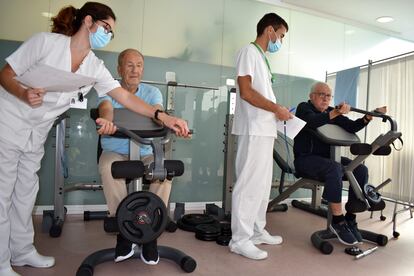Black humor, a talisman against fear
Laughter often arises from unbearable pain; it can be a cruel yet soothing way of facing the wound

Like many, I’ve faced some challenging moments in hospitals recently. It wasn’t for my treatment, but for my father’s. Within those walls, I learned a few valuable insights. I witnessed life’s fragility, the dance with mortality, and the art of offering grace. The patients struggle in pain, longing for respite as they watch others seemingly blessed with vitality. Amidst it all, humor becomes a sacred sanctuary, a talisman against fear.
My father was friendly with the orderlies and nurses. He has a knack for wordplay and puns, always willing to challenge the arbitrary Saussurean nature of linguistic signals that justify inclusive language. In the emergency department, my father pondered the need to reserve the word “patient” for those who accomplish monumental tasks or endure long ordeals. The term “sufferer” would be more suitable for people admitted to hospitals. Resist the temptation to stoically grin and bear it, and acknowledge that you’re in pain, connected to an oxygen tank, listening to the moans of a man with low potassium. Meanwhile, a girl is vomiting after attempting suicide by swallowing a bottle of paracetamol and uses her smartphone to livestream it all.
Comedian Lenny Bruce showed us that humor often arises from unbearable pain. It can be a cruel yet soothing way of facing the wound. Laughter sometimes amplifies the violence of pain, rendering it ridiculous. Other times, humor acts as a dignified shield, keeping anger, fear, loneliness and bodily malfunctions at a distance. These malfunctions may be routine for health care professionals, but that doesn’t make them any less intense for you. Sometimes superhuman kindness emerges, but your caregivers cannot fully empathize with you and the person next to you, because it would make them lose their minds and perspective. The detachment of surgeons in a film like M.A.S.H (it hasn’t aged well) is at the opposite end of the spectrum from the self-destructive abyss of Andrés Hurtado, the doctor protagonist of Pio Baroja’s The Tree of Knowledge, one of my first adolescent forays into literature. How about the Swiss sanitorium in Michael Mann’s The Magic Mountain? There is no shortage of medical drama on television: Medical Center, ER, Grey’s Anatomy, The Good Doctor, House… The American private healthcare system offers ample opportunity for spectacle with a dose of political justification. Meanwhile, Spanish medical dramas on TV like Hospital Central often indulge in the masochistic gloating of living with a public healthcare system. Or perhaps they are all designed to help us develop a specific muscle memory.
Amidst the endless satirizing of doctors that encompasses feelings of fear and dissatisfaction with the commercialization of healthcare, I find myself at a loss for words to convey the profound gratitude I hold for the dedicated professionals in public health.
Sign up for our weekly newsletter to get more English-language news coverage from EL PAÍS USA Edition
Tu suscripción se está usando en otro dispositivo
¿Quieres añadir otro usuario a tu suscripción?
Si continúas leyendo en este dispositivo, no se podrá leer en el otro.
FlechaTu suscripción se está usando en otro dispositivo y solo puedes acceder a EL PAÍS desde un dispositivo a la vez.
Si quieres compartir tu cuenta, cambia tu suscripción a la modalidad Premium, así podrás añadir otro usuario. Cada uno accederá con su propia cuenta de email, lo que os permitirá personalizar vuestra experiencia en EL PAÍS.
¿Tienes una suscripción de empresa? Accede aquí para contratar más cuentas.
En el caso de no saber quién está usando tu cuenta, te recomendamos cambiar tu contraseña aquí.
Si decides continuar compartiendo tu cuenta, este mensaje se mostrará en tu dispositivo y en el de la otra persona que está usando tu cuenta de forma indefinida, afectando a tu experiencia de lectura. Puedes consultar aquí los términos y condiciones de la suscripción digital.









































